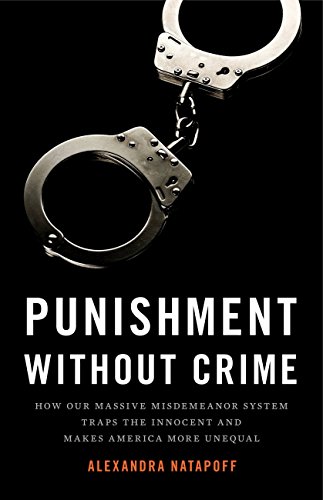Reading a good book — nobody will be surprised to hear I think this — is one of the most purest pleasures in this life, and Alexandra Natapoff’s Punishment without Crime is so so so good that I kept having to reschedule things in order to keep reading it. Natapoff is looking at the misdemeanor offenses that make up a massive percentage of the US criminal system. She examines the many ways the misdemeanor system violates the dignity and rights of those caught up in its net, and proposes solutions to ensure that all citizens receive justice.

I can’t say enough this book. Over the last year or two, I’ve become a little more aware of the ways in which minor crimes, such as driving without a license, can completely derail the lives, housing, credit, benefits, and employment prospects of Americans living in poverty. Punishment without Crime amasses an astonishing amount of data to show exactly how the system works–or doesn’t.
The gist of Natapoff’s argument is that the misdemeanor system as currently constituted inflicts massive financial, emotional, and physical harm on those caught up in its web. It does not improve public safety or even pay much attention to the guilt or innocence of the defendants. What it does do is draw marginalized people into the purview of the criminal system, sap their financial resources, and damage — sometimes permanently — their ability to access jobs, housing, and other resources that would pay the very costs the misdemeanor system is penalizing them for being unable to pay.
In many cases, Natapoff argues, defendants are criminalized only for being poor, and there are very few protections in place to ensure that innocent defendants get acquitted. For instance, if a misdemeanor does not carry the possibility of jail time, the defendant is not entitled to a lawyer; even defendants who are entitled to lawyers do not always receive them; and public defense lawyers carry such a massive caseload that they’re unable to represent their clients effectively. If a defendant cannot pay their bail prior to their case going before a judge, they’re often incarcerated pre-trial, often for a month or more. Innocent people accept guilty pleas just to get out of jail.
Some of this I knew, but Natapoff does a masterful job of pairing data and anecdotes to show both the scope and the human cost of the system. The stories are heartbreaking, and the data is too. Here’s an illustration of how legal financial obligations (LFOs) can mount and mount, creating cycles of debt that poor Americans will never be able to escape:
In California, for example, failing to carry proof of auto insurance carries a $100 fine. In addition, a person will be charged a $100 penalty assessment, a $20 criminal surcharge, a $40 court operations assessment, a $50 court construction fee, a $70 county fund fee, a $50 DNA fee, a $4 emergency medical air transportation fee, a $20 EMS fund fee, a $35 conviction assessment, and a $1 night court assessment, for a total of $490. If the payment deadline is missed, there will be an additional $10 DMV warrant fee, a $15 failure-to-appear fee, and a $300 civil assessment, for a total fee of $815.
Added to that, many states turn such debts over to private debt collection agencies after ninety days. These debt collection agencies are permitted to add massive surcharges (30 and 40% of the total amount owed!) on the uncollected debt.
Because (some) misdemeanor offenses are so minor, police officers have a massive amount of latitude in deciding whom to arrest on such charges. Overpolicing of poor neighborhoods and racial bias on police forces means that cops arrest disproportionately poor and black people for crimes that are poorly defined and/or incredibly common, like traffic violations, loitering, or resisting arrest. And because the legal proceedings for misdemeanors lack meaningful consideration of guilt or innocence, the arrest itself is often sufficient to lead to a guilty plea and a conviction.
Natapoff gives the example of an NYPD initiative wherein cops would go to specific housing projects and arrest massive numbers of people for trespassing, many of whom were there visiting friends or were even residents of the buildings in question. The people arrested frequently did not understand the parameters of the crime with which they were charged (I don’t know what constitutes trespassing!) (well, now I do, but only because I read this book), and few of them had attorneys with the time and energy to fight the charges. This meant that a lot of people pled guilty to charges they didn’t understand and might not have committed; and such convictions can lead to a loss of employment, housing, or welfare benefits.
As infuriating as the contents of Punishment without Crime are, and as exhausting as it is to witness the prejudice and injustice of a system that’s supposed to protect Americans, Natapoff ends on — kind of an up note? She points to recent bipartisan efforts to change the course of mass incarceration, and expresses hope that similar efforts will continue to gain momentum around the misdemeanor system. Honestly, she’s more optimistic about that than I am, but she also knows a lot more about it than I do! So maybe I’m wrong and she’s right! Wouldn’t that be good?
Meticulous, measured, and endnoted to a degree that satisfied even this stringent and demanding reader, Punishment without Crime will forever change how you look at so-called petty crimes. I feel truly fortunate that this book exists in the world, and I hope that everyone in the country reads it. (Seriously.)